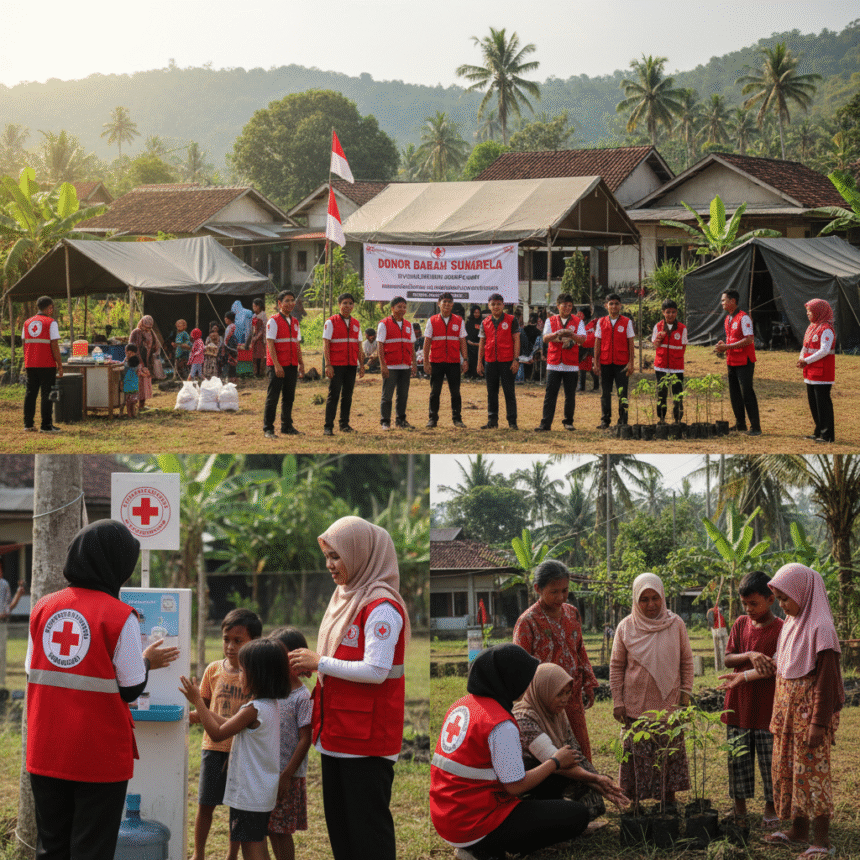Introduction: Why Korps Sukarela Matters Today
In a country as vast and diverse as Indonesia, community strength often comes from those willing to serve without expecting anything in return. Korps Sukarela (KSR) — translated as the Volunteer Corps of Palang Merah Indonesia (PMI) — is a powerful example of that spirit. Across villages, cities, and campuses, thousands of volunteers dedicate their time and energy to saving lives, supporting communities, and responding when disaster strikes.
KSR’s presence is more important now than ever. With Indonesia facing frequent earthquakes, floods, volcanic eruptions, and public health challenges, trained volunteers play a crucial role in disaster response, public health outreach, and humanitarian relief. By organizing blood donation drives, delivering first aid, or leading community development programs, KSR volunteers embody the essence of social responsibility and resilience. Their work shows that ordinary people, when united by compassion, can have an extraordinary impact.
Understanding Korps Sukarela (KSR)
Korps Sukarela, often abbreviated as KSR, is the official volunteer arm of Palang Merah Indonesia (PMI) — Indonesia’s national Red Cross society. It was created to channel the energy and commitment of citizens who want to contribute to humanitarian missions. Over the decades, KSR has grown into a structured and skilled volunteer network, supporting communities during emergencies and improving everyday life across the country.
The organization’s mission goes beyond emergency response. KSR embodies humanitarian principles such as neutrality, impartiality, and voluntary service. Members commit to providing first aid, participating in disaster preparedness training, and assisting with evacuation efforts when needed. Whether they are organizing a blood donation campaign or offering psychosocial support to disaster survivors, volunteers uphold the values of humanity and solidarity that define the Red Cross movement worldwide.
Structure and Organization of KSR
KSR operates under the umbrella of PMI, but its reach extends from the national level down to the most local communities. The organization is structured to ensure that volunteers can respond quickly and effectively wherever they are needed. At the top level, KSR collaborates with national disaster agencies and government ministries. On the ground, volunteer units are organized by region, city, and even neighborhood to provide rapid support during emergencies.
One of the most vibrant aspects of KSR’s structure is its strong presence in universities. Known as UKM KSR PMI (Student Activity Units), these campus-based volunteer groups give young people a chance to learn life-saving skills while studying. Many students join KSR as part of their commitment to social responsibility, and later continue volunteering even after graduation. In addition, specialized teams such as Satgana (Satuan Siaga Penanggulangan Bencana) focus on disaster management, while medical and logistics units handle specialized support during crises.
Core Responsibilities and Activities of KSR Volunteers
The work of a KSR volunteer is as diverse as the challenges they face. Disaster response is a major focus, with members trained to assist in evacuation, manage shelters, and distribute relief supplies during floods, earthquakes, or volcanic eruptions. KSR volunteers also support logistics operations, helping coordinate aid distribution and ensuring that essential goods reach affected families quickly and safely.
Beyond emergencies, KSR plays an essential role in public health and community development. Volunteers organize blood donation drives, lead first aid training sessions, and deliver health education workshops to promote safety and disease prevention. They also engage in community cleanups, tree-planting campaigns, and environmental initiatives, all of which contribute to long-term resilience. In addition, KSR teams often provide psychological first aid and Restoring Family Links (RFL) services — a crucial support system for families separated during disasters.
Training and Skills Development for KSR Members
Joining KSR is more than signing up to volunteer — it’s a commitment to gaining skills that can save lives. Every new member is required to complete a basic training program, often totaling around 76 hours. This training, known as Diklat KSR, covers essential skills such as first aid, disaster preparedness, communication, logistics management, and team coordination. It ensures that volunteers are well-prepared to respond confidently and effectively in high-pressure situations.
But the learning doesn’t stop there. Many KSR volunteers pursue advanced training modules in areas like water and sanitation, mass casualty management, evacuation techniques, and psychosocial support. Some choose to specialize in Satgana disaster response units, while others focus on public education and community engagement. These skill-building opportunities not only enhance volunteer effectiveness but also provide valuable experience that can benefit members in their professional and personal lives.
How to Join Korps Sukarela (Step-by-Step Guide)
Becoming part of Korps Sukarela is an inspiring way to serve your community and develop life-saving skills. The process is open to anyone who meets a few basic eligibility requirements. Applicants must typically be at least 18 years old, in good physical and mental health, and have completed a minimum level of education (usually junior high school or higher). Foreign nationals (WNA) are also welcome to join, provided they meet the criteria and follow PMI’s membership procedures.
The registration process is straightforward. You can apply directly at your local PMI office or through university KSR units if you are a student. After submitting your application and completing the required health checks, you’ll be invited to join the basic training course. Upon completion, you’ll receive a KSR certificate, officially welcoming you into the volunteer corps. From there, you can choose to participate in community programs, join specialized teams, or even pursue leadership roles within the organization.
The Volunteer Experience: Stories from the Field
Ask any KSR member why they joined, and you’ll hear a mix of inspiring reasons — from a desire to help others to the wish to make a real difference in times of crisis. Many volunteers recall their first experience responding to a natural disaster as a turning point in their lives. The chance to comfort survivors, provide first aid, or deliver essential supplies is both challenging and deeply rewarding.
For students, the experience can be transformative. Participating in university KSR units not only builds leadership and teamwork skills but also enhances career prospects. Many alumni go on to work in disaster management agencies, healthcare organizations, or humanitarian NGOs. But for most, the greatest reward remains the sense of purpose that comes from helping others — knowing that their efforts, no matter how small, can save lives and bring hope when it’s needed most.
Beyond Emergencies: KSR’s Role in Sustainable Community Building
While emergency response often captures the spotlight, KSR’s work extends far beyond disaster zones. Volunteers play a critical role in building community resilience — helping neighborhoods prepare for future crises before they occur. This includes organizing disaster preparedness workshops, setting up early warning systems, and supporting local governments in risk reduction efforts.
KSR is also involved in public health initiatives and sustainable development projects. From health education campaigns in schools to environmental programs like tree planting and waste management, volunteers contribute to the long-term well-being of their communities. KSR frequently partners with non-governmental organizations (NGOs), schools, and businesses to deliver these programs, proving that volunteerism can be a powerful tool for lasting change — not only in times of crisis but also in everyday life.
Challenges Facing Korps Sukarela Today
While Korps Sukarela (KSR) continues to make a meaningful difference across Indonesia, the organization faces several challenges that can impact its effectiveness. One of the most pressing issues is funding and resource limitations. Because KSR relies heavily on donations, government support, and public contributions, maintaining a consistent supply of medical equipment, logistics materials, and training resources can be difficult — especially in remote or disaster-prone areas. Limited funding often means volunteers must improvise with what they have, which can slow down emergency response and outreach programs.
Another significant challenge is volunteer retention and engagement. Many individuals join KSR with passion and enthusiasm but struggle to balance their volunteer commitments with work, study, or family responsibilities. As a result, local KSR units sometimes face shortages of trained personnel during emergencies. There’s also the ongoing need to keep up with new technologies and evolving disaster scenarios. With climate change increasing the frequency and intensity of disasters, KSR must continuously update its strategies, equipment, and training modules to remain effective. Ensuring that volunteers are equipped with digital skills, communication tools, and up-to-date disaster response knowledge is crucial for the future.
The Future of KSR: Innovation, Technology, and Youth Leadership
Despite these challenges, the future of Korps Sukarela looks bright — thanks to innovation, youth involvement, and evolving partnerships. As technology becomes a bigger part of disaster management and humanitarian work, KSR is adapting quickly. Volunteers are now using mobile apps to coordinate response efforts, digital mapping tools to track affected areas, and social media platforms to spread information during crises. This digital transformation not only makes operations more efficient but also helps KSR reach younger generations who are eager to contribute their skills to social good.
Youth leadership is another promising area. Across Indonesia, university KSR units are thriving, with students bringing fresh ideas and innovative approaches to volunteerism. They are spearheading awareness campaigns, leading community training workshops, and even collaborating with startups to develop disaster preparedness technologies. By empowering young people and integrating modern tools, KSR ensures that it remains relevant, impactful, and ready to face future challenges. Furthermore, increasing collaboration with NGOs, government agencies, and private sector partners will help expand KSR’s reach and strengthen Indonesia’s overall disaster resilience.
Conclusion: Why Korps Sukarela Needs Our Support
In every disaster, there are stories of courage — of people who rush toward danger while others flee, who offer help without hesitation, and who dedicate their time and energy to saving lives. Those people are often the volunteers of Korps Sukarela (KSR). Their work — from first aid and disaster response to community development and public health education — proves that the power of humanity lies not in institutions, but in individuals willing to act.
Yet, their mission cannot continue without support. Whether through donations, partnerships, or simply spreading awareness, each of us can contribute to strengthening KSR’s capacity to serve. More importantly, becoming a volunteer is one of the most direct and impactful ways to make a difference. Joining KSR means gaining life-saving skills, building stronger communities, and being part of a movement that embodies compassion, resilience, and solidarity.
In a world facing increasingly complex challenges — from natural disasters to public health crises — organizations like Korps Sukarela remind us that change begins with people helping people. And in Indonesia, that spirit of service is alive and thriving through the tireless efforts of KSR volunteers.
For more quality, informative content, visit writewhiz







